First, I want to express to you all that I am an euthenist of our brains. I am a Behavior Specialist and a Life Coach. My passion is helping others better understand themselves, so they can reach their fullest potential. And now I want to let you in on a little secret… There is a science to how we think, act, and feel. I am here to guide you on understanding how our brains work and how truly amazing they are.
Our Command Center in Our Brains
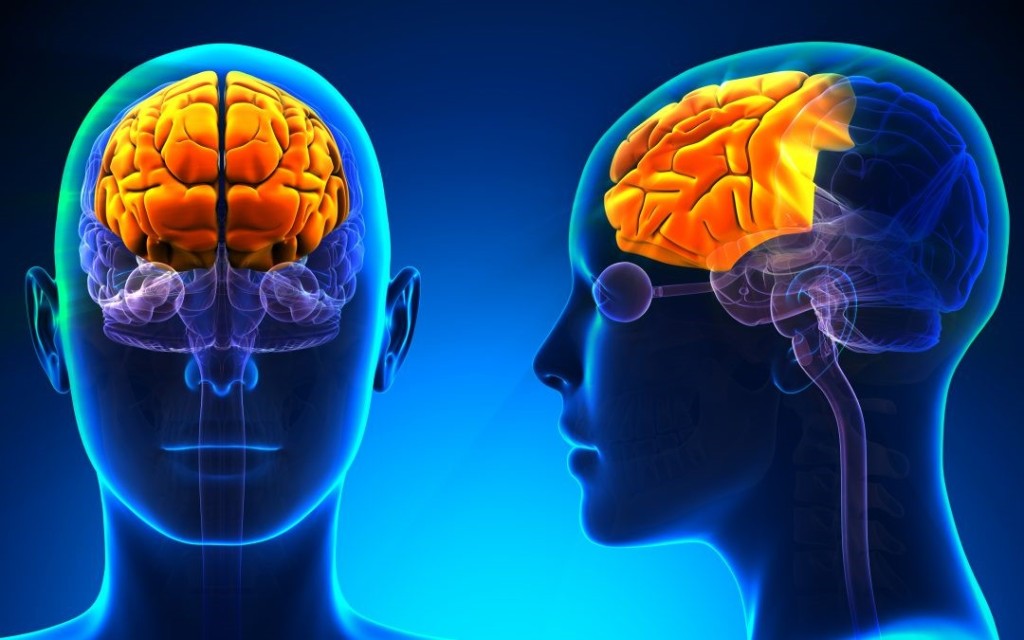
The Frontal Lobe makes up 2/3 of our brain. A small region in the Frontal Lobe, at the front of the head (forehead) and under the skull bones is where the Prefrontal Cortex lies. This is considered our “Command Center” or the boss of our brains and where our “Executive Functioning Skills” are found. It controls most of the higher order thinking that is essential for functioning smoothly in life. These skills help us focus on- what is important, to plan ahead, set and meet goals, overcome, and learn from failures, be aware and control our emotions, and think before saying or do something.
When we are babies our brains have billions of neurons rapidly connecting to each other as we experience the world around us, making trillions of connections in just the first years of our lives. Let’s go a little deeper and see what these neuron connections look like…
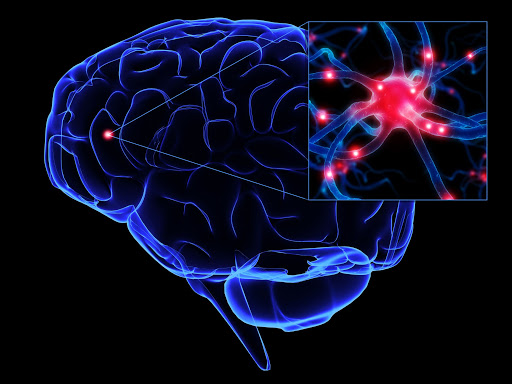
During our toddler years, these circuit connections are very simple, building and developing as we go through our childhood forming more complex circuits from the experiences we learn from our families, school, and friends. In our school-age years we start to develop more complex circuits that reach across all regions of our brains making our executive functions possible. The more we use these connections the stronger and faster they become. These circuits act like an air traffic control system in the brain, they manage incoming information and help us respond with intention not on impulse…
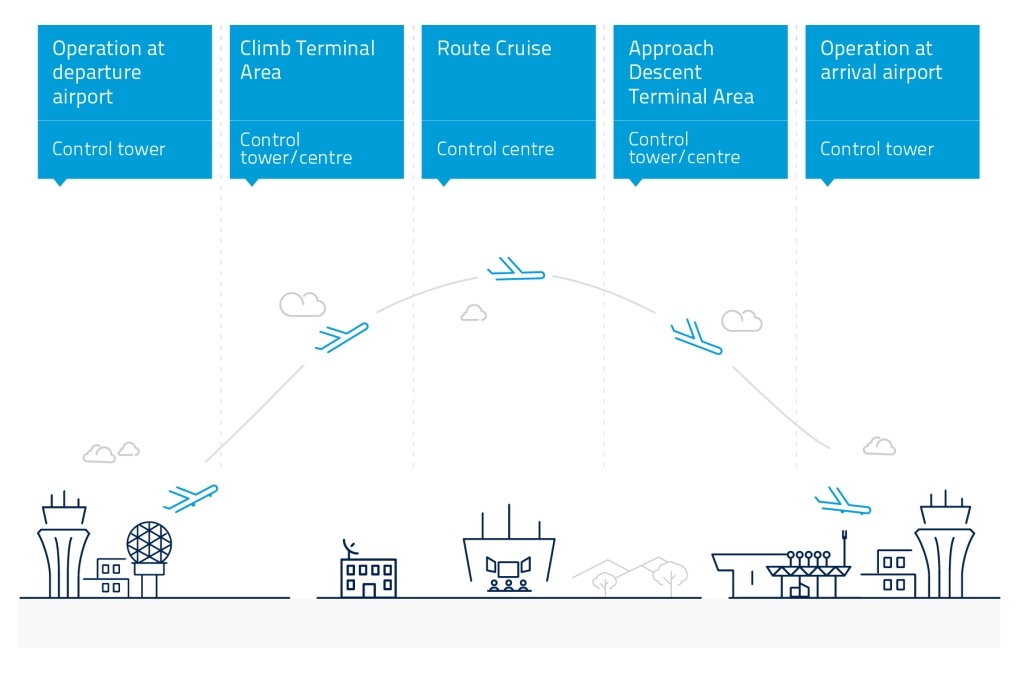
When we are under stress or going through stressful times, it’s hard for us to use our executive functioning skills properly. We all experience stress and at all levels and types… whether we are going through the hardships of poverty– like not having enough money for food, violence– like seeing riots on the media, illness– like knowing someone battling cancer, divorce or separate parents– like having parents and their children going back and forth from home to home, military– like knowing someone who is deployed, disabilities– like knowing someone with Autism or is paralyzed, mental health disorders– like anxiety or depression, natural disasters– like hurricanes or tornadoes, and even worldwide pandemics– like the Coronavirus…
At any point in our lives when these stressful situations occur, but especially during our childhood, it’s even harder for us to use our executive functioning skills effectively. On top of having past and present serious stress, our ongoing day-to-day stressors like catching the bus on time, paying bills, sitting in traffic, taking a test, fighting with family, or even losing a game can also have an negative impact on how we use our executive functioning skills. Threatening or stressful experiences activate different circuits. Here let’s take a look at our Automatic Nervous System…
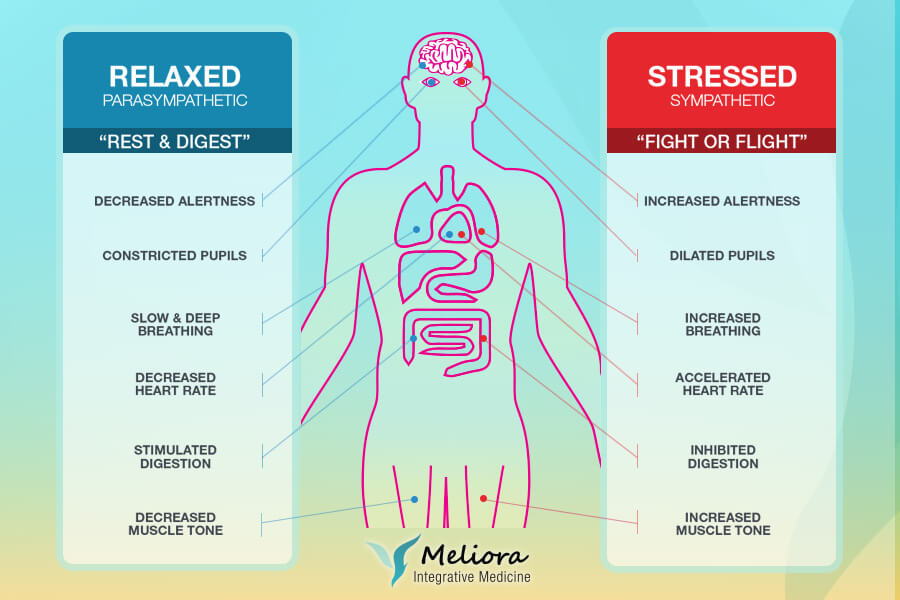
Certain experiences we go through activate specific circuits in our brains that trigger hormones and control involuntary responses like how we breathe, the pace of our heart is beating, and how our food digest in our stomachs. These two types are:
- The Parasympathetic Nervous System- we use this when we are relaxed
- The Sympathetic Nervous ystem- we use this when are stressed
When we are stressed the Sympathetic Nervous System trigger our brains to use the automatic responses of fight, flight, or freeze…
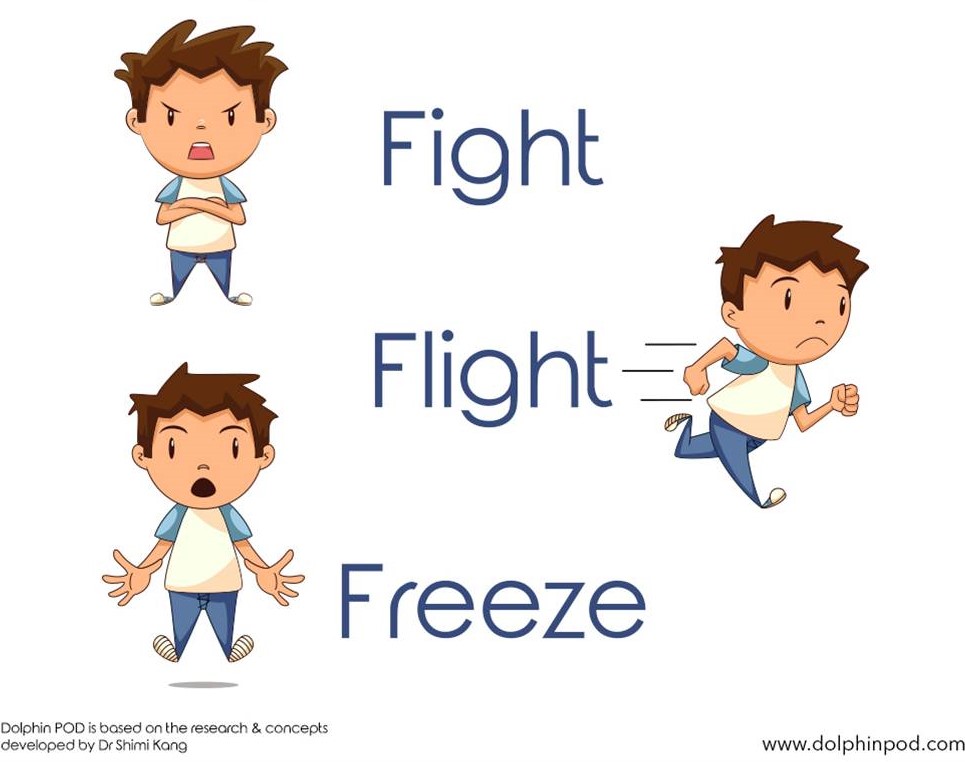
We need automatic responses for survival like… when cooking and the food catches on fire in your kitchen, you take action or fight to put out the flames… or when a barking, aggressive dog is chasing you, you run away or flight from the dangerous situation… or when you are about to cross the road and then you see fast car coming, you stop or freeze instead of going across.
But when we are stressed, our brains go into survival mode like… someone has disrespected our friends and we feel the need to defend them or fight and stand up to the bully… or when we feel scared or worried about what others may think of us because we did something embarrassing, so we avoid, hide or take flight from that embarrassing moment, not wanting to talk about with anyone… or when we are getting yelled at by our bosses, teachers, or parents because we did something wrong, we stand there eyes wide open, holding our breath thinking to ourselves “O dear I’m in trouble” or we freeze.
So, if we have stress happening a lot in daily lives than these automatic- fight, flight, or freeze circuits become stronger and faster than our more productive, intentional circuits, that we use for executive functioning. Stress not only impacts our brains but also the rest of our bodies, let’s take a look…
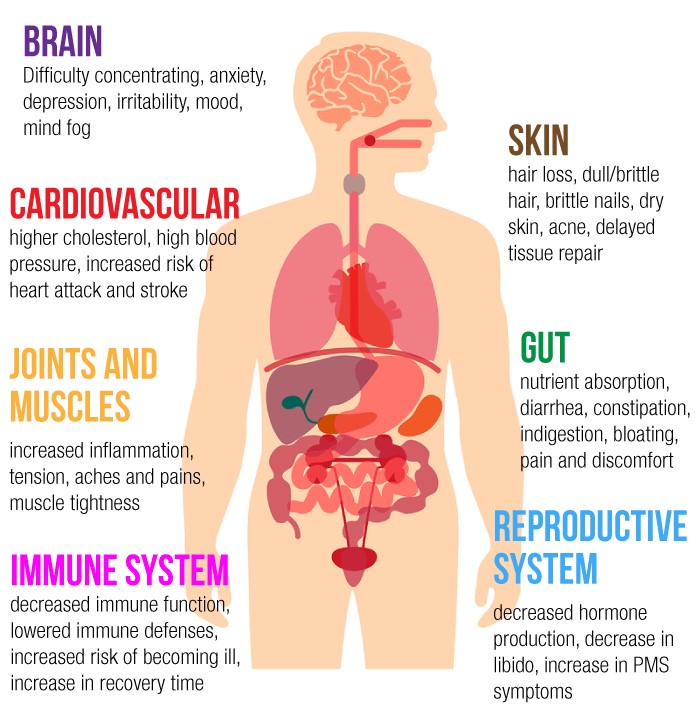
Small amounts will make us feel irritable or fidgety, having difficulty concentrating, sweaty hands, shortness of breath, our hearts beating fast, our muscles tightening or getting a stomachache…
But when we have continued stress for over long periods of time, this is where our bodies start to develop chronic-long term problems… From depression to anxiety in our brains, to acne on our face, to high cholesterol and blood pressure that increase the risk of a heart attack or stroke, to our stomachs not absorbing nutrients that cause diarrhea, constipation, indigestion, which in severe cases results to Irritable Bowel Syndrome and Disease, to increased inflammation, aches, and pains in our joints and muscles that cause Arthritis, to decreased immune system that helps our bodies fight colds and virus and in severe cases results in autoimmune diseases like Chron’s and Multiple Sclerosis.
The key to a happy and healthy life is by building strong executive function skills… I am calling these our Core Abilities… There are 5 Core Abilities… Let’s go over them…
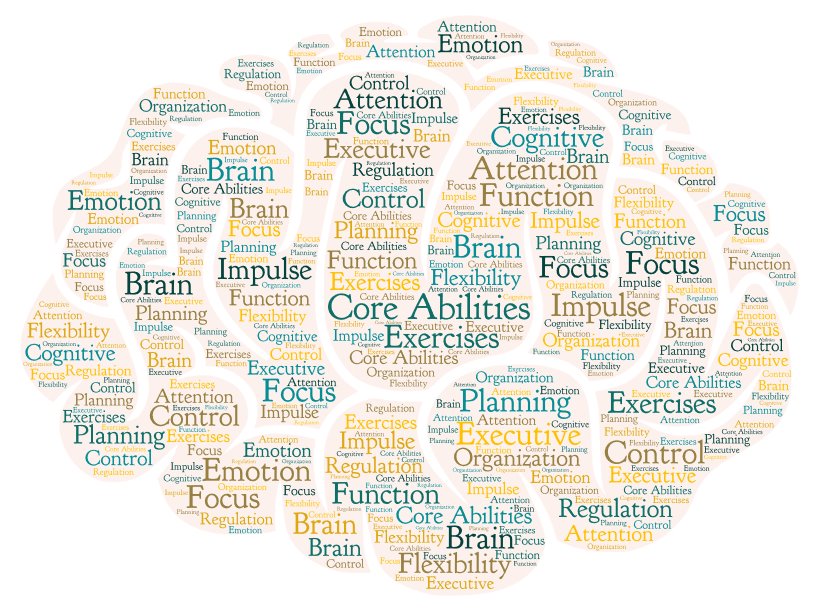
5 Core Abilities
- Focus and Attention
- Planning & Organization
- Cognitive Flexibility
- Emotional Regulation
- Impulse Control
The good news is these Core Abilities can be strengthened. During our childhood years, we build these abilities by playing games, learning teamwork, adjusting to new rules. We continue to develop these in our school-age and teen years by managing school and other things like chores, part-time jobs, sports, music, clubs, and relationships. We use these everyday without even knowing it, they are our natural, fundamental abilities that allows us to function through life. Some of them we are really good at and others we need improvement on.
Now I’m going to give you a quick introduction to all 5, so we have a better understanding of them…
1. Focus & Attention
Allows us to:
- Follow and understand instructions
- Listen to others and carry on a conversation
- Remember step-by-steps of an activity
- Take on and complete daily tasks and chores
The ability to pay attention and focus is a critical part of completing any daily chore, task, and even a life-changing goal for ultimate success.
2. Planning & Organization
Allows to:
- Arrive in time to school, work, and appointments
- Be prepared
- Have our house and school/work desk tidy
- Follow through with our plans (with friends, school, work, family)
The ability to plan and organize give us a head start on being productive and help make life run smoothly.
3. Cognitive Flexibility
Allows us to:
- Transition from one thing to the next (home to school/work, one assignment/task to the next)
- Try new things (restaurants, foods, sports, hobbies)
- Be creative and problem solve
- Adapt to any type of change
The ability to quickly change the way we’re thinking and behaving in response to the changes that happen around us is essential for life successes.
4. Emotional Regulation
Allows us to:
- Have good relationships with friends, family, teachers, co-workers
- Identify and understand what we are feeling
- Keep the intensity of our feelings in check
- Gain control of our emotional melt downs
The ability to regulate our emotions helps us navigate life’s unavailable problems, disappointments, and other stressors.
5. Impulse Control
Allows us to:
- Respect boundaries and rules
- Be more thoughtful than mindless
- Stop and think before we act
- Be patient and understand the importance of waiting
The ability to pause before we take any action in life helps us make mindful decisions.
Now let’s exercise our brains!
Think about what Core Abilities are your strengths (what are you go at)?
Now think about what Core Abilities you could improve on.
We all can improve each of our Core Abilities!
Resources and for more information:
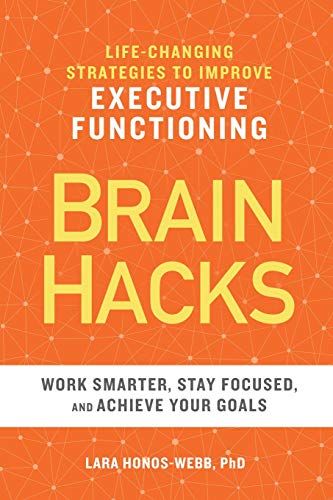

This is so informative and well written. Thank you for posting this article.
LikeLiked by 1 person